|
Ejaculate Responsibly Campaign A pro-choice AND pro-life male accountability campaign Spring 2024 When your bodily fluids have the potential to cause harm (such as unwanted pregnancy and/or exposure to STIs), you must be ethical, intentional, and accountable for your sexual decisions and ejaculation. “Men mostly run our government. Men mostly make the laws... if men were actually interested in reducing abortion, it didn’t need to take fifty years [after the fall of Roe v. Wade]. At any point, men could have eliminated elective abortions in a very short amount of time—a matter of weeks—without ever touching an abortion law, without legislating about women’s bodies, without even mentioning women. All men had to do was ejaculate responsibly. They chose not to. Today, they continue to choose not to” (Blair, 117). What inspired this campaign? February 14—March 24, 2024 is the nation's largest anti-abortion campaign: 40 Days for Life. The Women’s Center’s Ejaculate Responsibly campaign (a poster series with twelve unique messages) is an invitation to think differently about abortion, sexual politics, and accountability. This awareness campaign is inspired by Gabrielle Blair’s (2022) book, Ejaculate Responsibly: A Whole New Way to Think About Abortion. The purpose of this campaign is to provoke deeper interrogation of the pro-life/pro-choice dichotomy, which is a division or contrast between two things that are or are represented as being opposed or entirely different. Using Blair’s framework, we aim to bring a fresh perspective through awareness and attention to men’s choices and their primary role in causing unintended pregnancies. Knowing this, how can we change it? Ending unintended pregnancies and abortion is simple!
Men are responsible for their own sperm—they choose where it is placed. Men must be ethical, intentional, and accountable for potential harm caused by their sexual decisions and ejaculation (whether causing pregnancy or infecting a partner with STIs). The choice to prioritize one’s own desires/pleasure at the expense of others is an example of entitlement rooted in power inequality and privilege. Unfortunately, this is rarely discussed. There are many reasons for this, mainly that “our society is set up to protect men from the consequences of their own actions” (109). How have men’s choices impacted women? Historically and today, we live in a patriarchy. A patriarchy promotes and centers male/masculine privilege and maintains systems in which most positions of power, authority, and control are dominated by men. Putting the burden of all sexual and reproductive responsibility on women is a form of male privilege and sexism. While men have the most control and choice in the context of sex, it is women’s choices and bodies are endlessly critiqued, controlled, punished, and shamed. Despite how patriarchy naturalizes (“this is just the way things are”) women being over-responsible and men being under-accountable, women are never responsible for men’s behavior. Men are responsible for their own choices, behavior, and bodily fluids. Men have the most control and choice in the context of sex by:
Pregnancy Concerns
These differences matter and impact women’s lives long-term, especially in the context of our social and economic systems that have been set up to intentionally pay women less and/or not be compensated for their labor at all. Gender Violence Impacts In addition, the prevalence of men’s sexual and relationship violence are significant factors that take away the reproductive choices of women.
Conclusion People of all sexual orientations and genders who want to have sex can have wonderful, fulfilling sex lives without causing pregnancy. There are many ways to experience sexual pleasure without the risk of pregnancy: masturbation, using hands/fingers/mouth/tongue to stimulate your partner, using sex toys, or only having sex with people who are unable to cause pregnancy. Abstinence is also a great option for some. After all, let’s be clear: no one is entitled to sex, ever. Responsible ejaculation is both a pro-choice AND pro-life solution that is not rooted in controlling, coercing, or forcing women to give birth. This solution places responsibility where responsibility belongs: it is men’s responsibility to ensure they don’t impregnate. Men must take personal responsibility for their own sperm. We need to raise the bar for men. We share these messages because:
We believe in men’s ability to make safe, thoughtful, and equitable choices that respect women. We believe men can and must ejaculate responsibly. [1] Binary language is used for the purpose of conciseness. When we reference men we are referring to cis men, people who have sperm, and people assigned male at birth (AMAB). When referencing women we are referring to cis women, people who have the capacity for pregnancy, and people who are assigned female at birth (AFAB).
0 Comments
 The gorgeous art piece pictured above is appropriately named "Glitoris." It's a powerful and imposing figure that we have been moving around campus. It is, you guessed it, a replica of the internal structure of the clitoris. This sculpture was inspired by Sophia Wallace's "cliteracy art" project and was re-created by one of our art students to raise awareness and educate people on the sexual pleasure of women (and people of other genders who have a clitoris). Even as a feminist in college, and as someone who has been very open about topics related to sex for most of my life, I don't think I heard someone else say the word "clit/clitoris," out loud, until I was in my early 20s. Even today, this word, this body part, is treated like a slur, a secret, a subjugated knowledge. How people (do not) talk about the clitoris is precisely why our campus Women's Center chose to do programming--events, speakers, tabling, awareness, outreach, postering, and hosting a (now infamous) "Find the Clit: Sex Ed Scavenger Hunt." Women genuinely enjoying sex incites astronomical levels of misogyny, even in a porn culture. Only in a patriarchal, sexist culture (religious AND secular) would such discomfort occur as a result of us unashamedly speaking and educating about this--even on a college campus, a space for adult learners, a space that many people see as protective "free speech," embodies "liberal values," and/or is supposedly "sexually open." Not so much. We received all sorts of strange responses and backlash for these events from inside and outside of our campus community: continuous complaints, threats, people trying to cancel or hide our event, people calling to yell at us for how "offensive" our programming is and labelled us "groomers" that are apparently promoting rape because we are educating grown adults on a college campus on the clitoris in 2023. It was a wild semester. When I used to speak and educate in faith communities that were often very conservative, I would remind them that sex IS for pleasure and pleasure is the primary reason people have sex. On what ground could I make such a claim (besides the fact that people who are capable of reproducing are only fertile a few days per month)?? Well, I had to remind church-goers in the pews that someone created the clit, and according to their belief system, it was God. Cool, right? I could feel the deep exhale from a very tense religious crowd. What a relief for folks to know that the sole and only purpose of a clitoris is for sexual pleasure. As I let that statement sink in, I could visibly see the wheels turning and belief systems challenged/shifted. Why is knowing this so powerful? Because a penis has multiple functions. A vagina has multiple functions as well. But God/the creator/universe very intentionally chose to bless the female body with an extra part for no other function but sexual catharsis. Oh, AND women can have multiple/endless orgasms!! So clearly the creator cared a whole lot about pleasure and women enjoying sex. In addition, the most clitoral sensitivity and nerve endings are external on the vulva, not inside the vagina. (Side note--that should also make the straights question the centrality of penis-in-vagina penetration-focused sex). Maybe all this female sexual power and capacity for pleasure is why men in this world have gone to such extreme lengths to control and colonize our bodies and sexuality. Maybe God is less uneasy and uncomfortable with female sexual pleasure than us humans are. God is less of a prude than your average dude or patriarchal church. Despite this, women's sexual pleasure is still so taboo and shamed--not only in conservative or religious communities--everywhere. However, discussing and educating others comprehensively on healthy, egalitarian, pleasure-based sexuality is a primary sexual violence prevention tool, proven by decades of research. Women's sexual pleasure is still treated as a frivolous privilege, a bonus, afterthought, etc. Research shows that even after multiple waves of sexual revolutions, the sex lives of women have not improved all that much over the past 50 years. Beliefs around sex roles and men's sexual entitlement/self-centeredness is still deeply-rooted. Lesbian women are the most sexually satisfied demographic, in stark contrast to women who have sex with men. What can men learn from lesbian and queer women? A whole lot. Men should be taking notes from lesbians... oh, and maybe ask their own female partners what they want in bed? For a society that is convinced it is so sexually liberated, we can't even get the most basic stuff down (saying anatomical body part names out loud, respecting boundaries and consent, and valuing the sexual pleasure of all). I highly recommend reading one of my most favorite books for more analysis on this: The Tragedy of Heterosexuality by Jane Ward. Ward is a lesbian who feels like she needs to be an "ally" to straight women. She feels the experience of too many straight women is a lifetime of suffering trying to be in relationship with sexist men... men who only want women because of what women do for them. And women who respond by exhausting themselves trying to convince/change/rehabilitate/fix men. Included in this straight-woman-suffering is enduring serious sexual violence, trauma, and simply mediocre or bad sex. I have observed this as a frighteningly common experience of women and resonate with Ward's findings as an advocate who has worked all of my professional life with survivors of sexual violence and on issues of patriarchal violence, feminism, and gender equity. I feel this has been a life-long frustration of mine: I constantly see fabulous, brilliant, powerful women in my life stifled by dweeby, clueless, or downright dangerous men who don't give a shit about them. My life goal is raising the insultingly low bar we have for men and calling them to a higher standard. Men's sexual entitlement to women's bodies, with minimal/no knowledge or care regarding how to please them, is not only pathetic, it's actually disturbing. It should be fundamental, expected, and *required* that people having (supposedly??) consensual sex are both enjoying it and experiencing pleasure. When bombarded by porn and media that portrays sex in a patriarchal, competitive, transactional, coercive, conquering, male-centered, and violent way, clearly this is a wild concept and needs more attention. What does that say about how shamed women's sexuality is when grown adults cannot even say the word "clitoris" out loud (and if they do, are deeply embarrassed about it, and avoid it all costs)? The personal is political and the political is personal. Women's sexuality and pleasure is not trivial. The fact that women's sexual pleasure is so devalued and stigmatized simply imitates, mirrors, and reflects broader structures and systems that devalue women as an entire class. If we are going to end patriarchy, sexism, and misogyny, our sexual practices, and how we talk about them, matter. We all need to become cliterate because women deserve better. A statement I wrote for our campus program below (the Center's name has been removed): Statement on Victim-blaming and Accountability for Patriarchal ViolenceFeminist analysis of patriarchal violence[1] recognizes violence as a functional tool of oppression (e.g., a dominant group forces submission of a subordinate group, particularly through an illusion of consent or when non-obvious coercive routes are exhausted).
Sexual violence, and all forms of gender and power-based abuse, are forms of political and social oppression that are not the result of an individual survivor’s choices, ontology, identity, vulnerability, character, or reputation. [The Center] uses, and is not opposed to, risk-reduction[2] as a general concept, idea, or strategy. The [Center] does employ some risk and harm-reduction strategies (e.g., education on egalitarian/ethical relationships and sexual consent and communication). However, many common risk-reduction strategies perpetuate oppressive belief systems rooted in sexism, heterosexism, colonialism, white supremacy, neoliberalism, etc. Many common risk-reduction tactics and “safety tips” directed at systematically subordinated groups are only marginally applicable in more rare, stranger-perpetrated sexual assault cases. These tactics often perpetuate inaccurate, sensationalized, and narrow stereotypes of sexual violence that do not capture the broad scope of the issue. Most sexual violence is committed by a person the victim knows and trusts (dates, partners, spouses, friends, co-workers, classmates), as well as authority figures, people of high status, and “helping” professionals in which the public often trusts (clergy, police and criminal/legal professionals, mental health professionals, educational professionals, coaches, supervisors, medical providers, politicians, military, celebrities, etc.) The [Center] is committed to working within our community to change the institutions, systems, and broader culture and politics that normalize violence. We want to invest in ending the harm, not change or constrain the liberty, movement, and behavior of survivors/the people harmed by those systems. We focus our efforts on primary prevention—this means uprooting systems of oppression, stopping violence before it starts, preventing perpetration, and building long-term solutions that address the fundamental causes of violence. In order to eradicate violence, violence must be confronted at every scale (interpersonal, familial/household, community, institutional, systemic, state, and global) and not remain isolated to only the interpersonal. Our vision is not only to abolish patriarchal violence and rape culture, but to make patriarchal violence unimaginable. This also means we work to shift power in a concrete and material way, end dehumanization and sexual entitlement, and resist the belief systems that view human beings as objects to be possessed, commodified, and controlled (the ideological foundations that precede violence). At the [Center], we do not believe behavior-change on behalf of individuals will ultimately stop or prevent violence, because abuse and violence are always a choice by the person/group who cause the harm, not the responsibility of the person/people victimized by it. There is no guaranteed way to “protect” oneself against relationship violence, stalking, sexual harassment, exploitation, and/or trafficking. While there are no perfect victims, a person can do everything considered “right/cautious,” take every “safety precaution,” or implement every “risk-reduction” strategy, and still be violated and abused. A victim/survivor’s choices or character are irrelevant to an abuser’s choice to abuse (e.g., dress, drinking, flirting, who they hang out with, sexual decisions, “risky/dangerous situations/environments,” how they respond/resist sexism and violence, reporting decisions, or levels of personal vulnerability, assertiveness, self-esteem, and/or confidence). Vulnerability is not inherent to an individual but is intentionally created by systems of oppression and dominant groups to subordinate, marginalize, and target particular groups. Violence/abuse perpetrated against a person is never, regardless of the context, the fault or responsibility of the person victimized. Perpetrators are motivated to perpetrate for many reasons independent of the person they abuse. In addition, promoting individual changes to a potential victim’s behavior does not mean the abuser won’t abuse, it may mean the abuser abuses regardless, and/or they may choose to target a different person to abuse. Either way, the abuser usually continues abusing as they are socially rewarded and not held accountable. While our center works to educate and raise consciousness on ethical relationships and sexuality, education alone is not enough to protect someone from abuse, because they do not hold systemic power and are not in control of the abuse. For example, educating people of color on racism (what racism is, how to identify it, etc.) will not stop systemic racism. Educating disabled folks on ableism or queer folks on homophobia, transphobia, and heterosexism will not end it. Likewise, a victim/survivor’s knowledge and ability to identify abuse does not mean the victim, on their own, can prevent it or has the power to stop it. Victim-blaming messages directed at subordinated groups are used to distract the public from challenging the oppressive behavior of dominant groups. Cis women, femmes, people who experience/d feminine socialization, and other marginalized groups often internalize and have been lectured their whole lives to modify their behavior, dress, etc. to appease or de-escalate cis men and other dominant groups. [Our Center] is committed to not perpetuating these messages. This statement was written for accountability purposes and to share our [Center's] analysis of violence as an informational and educational tool. If you see our [Center] share any type of messaging through social media, presentations, awareness campaigns, advocacy, support services, etc. that conflicts with the analysis above in this statement, please contact [us] immediately. Your feedback and accountability is critical to us. Sincerely, Rebecca Kotz [1] “Patriarchal Violence (PV) is an interconnected system of institutions, practices, policies, beliefs, and behaviors that harm, undervalues, and terrorize girls, women, femme, intersex, gender non-conforming, LGBTQ, and other gender-oppressed people in our communities. PV is a widespread, normalized epidemic based on the domination, control, and colonizing of bodies, genders, and sexualities, happening in every community globally. PV is a global power structure and manifests on the systemic, institutional, interpersonal, and internalized level. It is rooted in interlocking systems of oppression.” – Black Feminist Future [2] Examples of common sexual assault risk-reduction (primarily with strangers) strategies: carrying pepper spray or weapons, “buddy systems,” not drinking, pouring your own drinks, not leaving drinks unattended, not going anywhere alone, not wearing clothing perceived by men as “sexy”, self-defense classes, carrying your keys in your hand, not wearing headphones/talking on a cell phone, avoiding elevators and stairs, avoiding poorly-lit areas, remaining alert/vigilant, etc. Though these tactics or behavior changes can create a feeling of safety, they ultimately will not prevent sexual violence. In March of 2022, I piloted this new presentation with women student leaders at the College of St. Benedict's and at a St. Cloud State University human sexuality class. The session was titled, The Revolution is COMING: Sexual Politics, Pleasure Equity, and Cliteracy. This session gives participants an opportunity to (re)learn and discuss the politics around women's sexuality, pleasure and orgasm in/equity, cliteracy, and examine cultural messaging about sex and gender roles, desire, and the impact of sexual trauma on sexuality. I also share resources and strategies for change.  Sporting my "glitoris" shirt prior to presenting on campus Sporting my "glitoris" shirt prior to presenting on campus This is a great presentation topic for college students, adults, women's groups, men's groups, pre-marital/marriage groups, conferences, etc. What inspired me to take on this new topic is recognizing how little people of all genders know about the clitoris and the lack of prioritization of pleasure for people who have them! I have had many conversations with women of all ages who had been having sex for years (even decades!) and did not know where their own clitoris was located and/or never had an orgasm. This both pained me... and pissed me off. THIS IS A FREAKING TRAGEDY YA'LL... Our "sexual education" system protects patriarchal sexual norms. "Sex ed" is purposefully designed to invisibilize and fail women, queer, and gender-marginalized folks. At the college I work at, students were really interested in inviting a speaker to talk about the orgasm gap on campus. We searched... and there were only a handful of speakers we could find throughout the country that spoke on this topic... and only one or two speakers who lived in our state. So, here I am. Talking all about clits and other important stuff because women's sexual lives are not trivial. Another one of my many life missions is for women to have better sex and to openly, proudly, unashamedly talk about women's sexual pleasure and orgasm equity. The personal is political and the political is personal! I am a feminist practitioner with a social and political science background. No, I can't tell you the biology or give the detailed specifics surrounding the science of arousal and orgasm, but that's not really what I see audiences are looking for anyway. Pleasure/orgasm inequity has far less to do with biology, sex/gender differences, or actual orgasm difficulties as it has to do with power, social and cultural norms, patriarchy, sexism, sex/gender roles, sexual entitlement, and this fabulously accurate new term I'm hear more: "strategic incompetence." It also has a lot to do with who defines "sex."
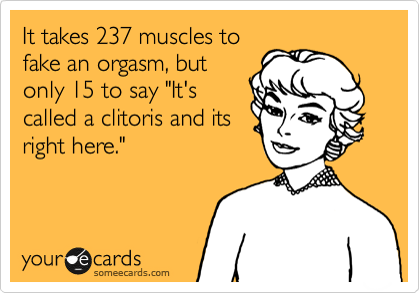 Those questions are mostly rhetorical, as the answer(s) is literally hitting us on the head with a giant brick. So, is the content I share in this presentation cutting-edge, earth-shattering, wildly innovative, and novel? Nope. Sometimes, we just have to collectively face the music. I'll be sharing the research, allowing us some space to discuss, learn, unlearn, and think critically to confront the silly sexual messaging we receive about the "mysterious female orgasm" because, oh heavens, women's bodies are sooooo complicated. *Eye roll* Yes, there a bit of snark in this presentation. How could there not be? Sometimes, we must laugh at the absurdity. And then... fight for the revolution. It's COMING. 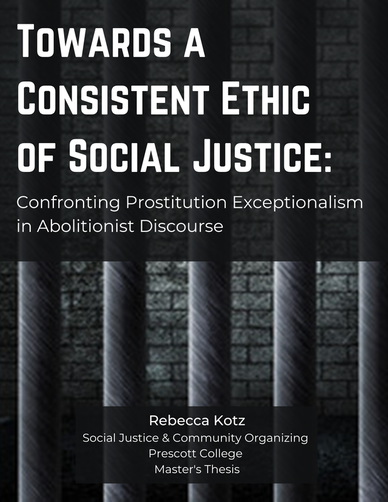 Social Justice & Community Organizing Master's Thesis Abstract (c) Rebecca Kotz | May 9, 2021 Please contact me if you are interested in reading and/or providing feedback on this thesis! Please e-mail me at rebeccakotz@yahoo.com Abstract Are [prison] abolitionists committed to ending all forms of oppression, or do exceptions for sexual exploitation exist? This thesis uses radical feminist, anti-neoliberal, neo-Marxist, and anti-violence movement analysis to examine and confront the ideological contradictions in prison abolition discourse. Though abolitionist discourse promotes revolutionary, anti-capitalist principles, it adopts neoliberal “sex work” ideology that reinforces objectification, commodification, and the globalization of the prostitution industrial complex. Abolitionist discourse recognizes the multiplicity of harm and enslavement but supports a false consent/coercion binary that ignores the entrapment and less visible cages within the sex trade. While claiming to envision transformative justice, abolitionist discourse pivots to prostitution reformism and tolerance of sexual exploitation. Finally, abolitionist discourse analyzes how spectacles of violence create public support for prison expansion yet does not consider how pornography acts as similar propaganda that normalizes sexualized dominance and sadism. The significance of these findings affirms the essential need of the prostitution and prison abolition movements to join forces to end interpersonal and state-sanctioned patriarchal violence to advance a consistent ethic of social justice at every scale. 200+ prostitution buyers convicted in central Minnesota. Most men are never caught. Exploiters are... our brothers, husbands, sons, athletes, clergy, police, military, educators, co-workers, business owners, classmates, public officials, our president... 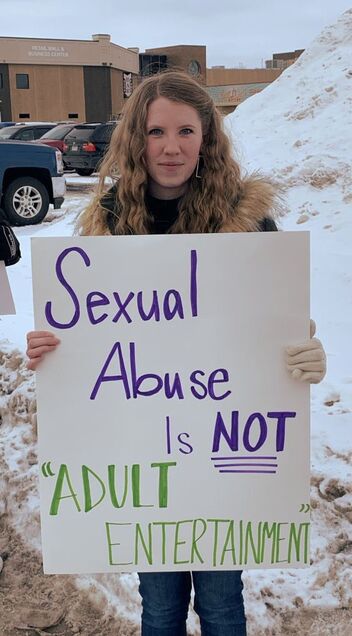 Rally speech from the Stop Traffick: End Demand 2020 Demonstration held in Saint Cloud, Minnesota on January 25th, 2020. "We have made some amazing progress in the past ten years thanks to the tireless work of victim/survivors, advocates, and activists throughout the state, country, and across the globe. In this new decade, we are moving the conversation forward. By now, many have recognized that anyone can been sexually exploited or trafficked. On the other hand, how many of us have truly considered that anyone can be an exploiter, rapist, abuser, or trafficker? That people we know, people we love and respect, even people who claim to be allies to women and survivors, are capable of this? Today we honor January’s Human Trafficking Awareness Month with renewed commitment to bold anti-violence activism with a strong message centered on promoting male accountability and systemic change against patriarchal, sexist oppression. During the planning process for this event, we wanted to be intentional about how this message was framed today. No one would say they are PRO-exploitation/trafficking. However, what we’ve learned as we’ve done education in the community—is that once we get into the details, once we talk about what sexual exploitation encompasses—who is doing it, where they are doing it, and why they are doing it--suddenly people want to draw lines, debate the exploited person's “choices,” and discuss the so-called “nuances” of the issues. These are all excuses to do nothing. We need to take a closer look at men’s choices: 1 in 5 U.S. men self-report buying a human being for prostituted sex. At least 75% of men use porn at least once a month. Men’s use of strip clubs is also normalized where men bond over sexual objectification. This is even seen as a “rite of passage” for young men's birthdays and bachelor parties. What often happens when we talk about power-based abuse and violence is that we don’t name the source of the problem. We have been conditioned to submit and to protect the very individuals, institutions, and systems responsible for oppressing and exploiting us. We’re not doing that anymore. Male violence is not an accident or a misunderstanding. We need to stop treating male violence as if it is an unfortunate natural disaster that "just happens." It’s a conscious choice. It’s a functional act—both personal and political—to terrorize and subordinate women and children. As feminists have been saying for decades, "prostitution is the world's oldest form of patriarchal oppression." The irony of all this is that the dominant groups and oppressors (particularly men, white people, and the rich) are always centered in our culture… except when they do bad things. Then, they suddenly become conveniently invisible and people get uncomfortable when they are named. We need to lean into the discomfort. Choosing comfort over justice is why people in power get away with the atrocities they do. Today, we are naming the problem and we are naming the solution: it’s men. This is also not an issue that arises from isolated individuals. Patriarchy, sexism, racism, white privilege, capitalism, classism, militarism, colonialism, heterosexism, and ableism culminate into a sadistic industry controlled by men, demanded by men, and profited to men. The bar for men right now is insultingly low. And we need to raise it. When people talk about men’s use of women in prostitution, porn, and strip clubs, we no longer will say “boys will be boys.” We say boys and men will be held accountable. We expect men of integrity. We need men to stand alongside us, not sit back and remain silent. We expect men refuse to use sex as a tool to violate, conquer, control, or commodify us. We expect men and boys to treat women and girls, and all people, with respect, equality, dignity, safety, and mutuality. We expect men to make choices to give up their advantages and entitlements to work towards our collective liberation. And we’re not going to beg for it or offer trophies for decency. We have the power to relearn and teach these beliefs and build a different world. That kind of world is one worth fighting for and it is in our hands. Sexual exploitation is not inevitable, it is preventable—but as Frederick Douglass said, “power concedes nothing without demand,” which is why we are here today. We are demanding an END to sexual exploitation—once and for all." 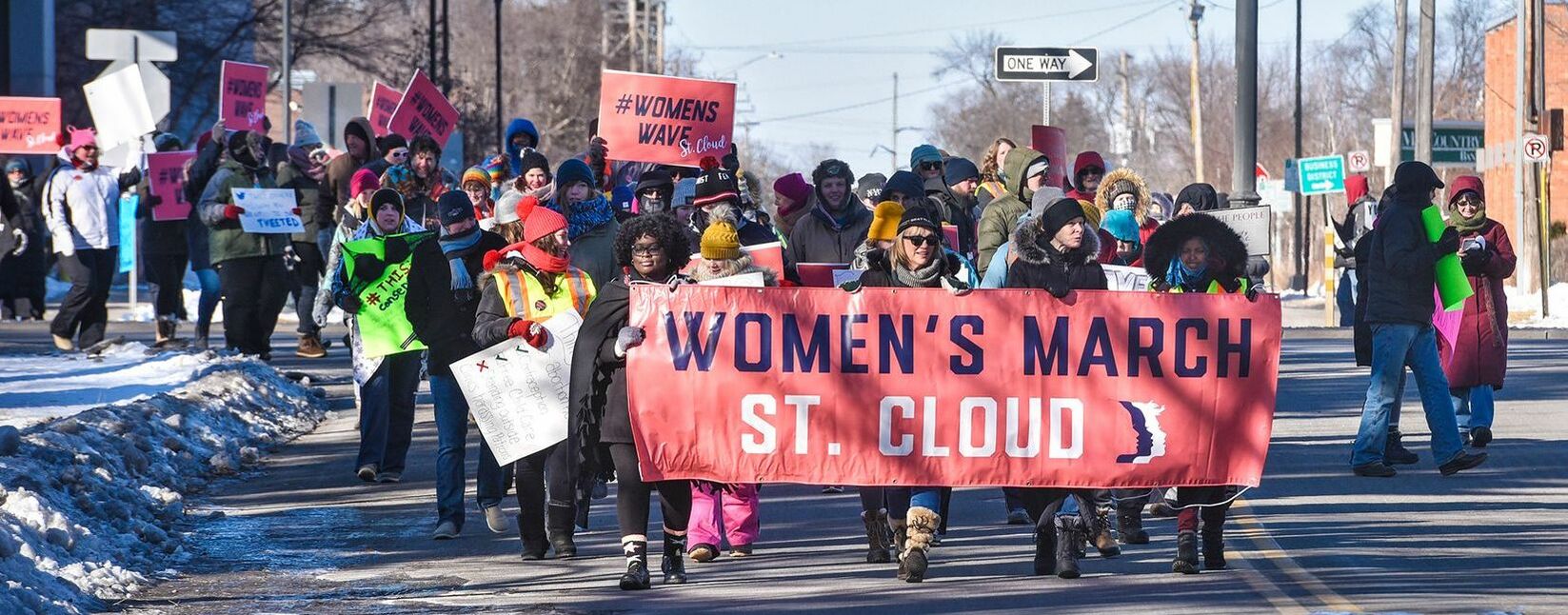 Photo from St. Cloud Times https://www.sctimes.com/media/cinematic/gallery/2626964002/cold-temperatures-dont-stop-womenswave-marchers-in-st-cloud/ Photo from St. Cloud Times https://www.sctimes.com/media/cinematic/gallery/2626964002/cold-temperatures-dont-stop-womenswave-marchers-in-st-cloud/ I was asked to speak about sex trafficking at the St. Cloud, Minnesota #WomensWave March on 1/19/19. Here's a little background/all the things I couldn't say in the speech: In a large audience of mostly progressive women and men, I did not want to waste a precious and extremely brief, three-minute platform, to talk about an issue as uncontroversial as sex trafficking. Everyone in that audience would agree this is a terrible injustice. However, I wanted to challenge what I felt the audience might not agree on- commercial sexual exploitation/prostitution, or what some in this crowd would call "sex work." Though there are some beliefs within the "sex worker's rights" platform that I do agree with, their fundamental premises I cannot. I don't believe prostitution is "work" like any other, I don't believe "stigma" is what causes additional violence to prostituted people (what causes violence are the actual agents of violence- almost always male buyers and traffickers), I don't believe paid coercion can ever be consent, I don't believe prostitution can ever be non-exploitative, and I don't believe in harm-reduction-only "solutions." I want to make clear that these statements I've made do not stem from a distanced and detached academic analysis. My views have been carefully developed through years of direct experience working with survivors of the sex industry, prostitution, and trafficking, from facilitating a male offenders program, and from the wisdom of many survivor-activists and feminists who know this issue inside-and-out because they have lived it. At our advocacy center, we use the empowerment model. We do not support paternalistic practices. We do not claim to "rescue" people or ever use such language. If there is any "rescuing" going on, it is our clients who rescue themselves. They are their own s/heroes. Any professional that takes credit for a survivor leaving the life has a savior complex that needs to be addressed. But as much as SWRAs claim all professionals in the field are like this, that is simply not true. (But quick PSA to faith communities: please stop doing this!) We do employ harm-reduction approaches (e.g., safety planning and handing out condoms and lube), while also fighting for the total abolition of the sex trade. That is because we are not defeatist. We do not believe so little of men that they will forever use women's bodies as masturbation fodder. We will not enable bad behavior by men and agree that "boys will be boys." We will not respond with a shrug and say, "Oh well, sexual abuse has existed for a long time, so we just have to accept it, maybe make sexual violence a little less violent, and move on." No. That is unacceptable. We are either massively burned out or in the wrong line of work if that is our response to sexual abuse in any form. However, sometimes grief and hopelessness in social justice work "boxes us in" and limits our capacity to creatively envision a world outside of what we see in front of us. When it comes to these issues, it does not have to be one or the other (e.g., harm-reduction or abolition, shame everyone in the sex industry or shame no one). As an agency, we advocate and emotionally support all people in the sex trade, regardless of where they are at, regardless of if they plan to stay or plan to leave... while still critiquing and working to abolish the sex industry/trade that exploits them. Yes, you can do both. Shame and judgment have historically been reserved towards the exploited, prostituted, and trafficked- but this is victim-blaming, wrong, and 100% misplaced. Those who are prostituted should never be judged or shamed. The blame rightfully belongs on the exploiters who made the choice to exploit. The buyers (rapists) and traffickers (facilitators and profiteers of mass gang rape) have remained invisible and unaccountable for too long. Times up. So with all that background, here's what I said... (Intro, name, agency, etc.) Many of us here know that sexual exploitation is a serious issue and is happening in our community. CMSAC serves close to 100 victims of exploitation/trafficking each year, and the number of people we serve only scratches the surface. No one would argue that trafficking is acceptable, and that’s why we need to talk more about prostitution and pornography, which is what traffickers make their victims do. Society often sugarcoats the reality in which a person in prostitution lives. Regardless of if she has a trafficker or not, whether she was groomed through sexual abuse or groomed by a misogynist culture, whether she is sold on the streets or sold in the nicest hotel room, whether she is paid $1 or $1000… A fancier environment and all the money in the world does not erase the trauma of being used as a sex object. Prostitution takes place when entitled, mostly white, men bribe access to women’s bodies, especially Black, Native, and other women of color. He pays her to do what he wants, when he wants it, how he wants it. He pays to control her dress, her speech, and her body. All coerced sex, including sex coerced by inequality, survival, or financial struggle, is sexual assault- a violation of human rights. In 2019 and in the #MeToo Era, this should no longer be up for debate. Agencies like the Central MN Sexual Assault Center and Terebinth Refuge that work with victim/survivors of the sex trade on a daily basis, we do whatever we can to support, advocate, and help strategize with them to reduce harm in whatever small way we can- because some survivors don’t see a way out, some don’t have the resources to leave even when they desperately want to, and some traffickers have convinced them that this is the only thing they are good for. We are privileged to be able to march today. Many women can’t. They’ve been murdered, battered, violated, silenced, and terrorized. We as feminists can honor these women by speaking up in solidarity and telling the truth even when it’s not comfortable or popular: prostitution is not a “choice” that women enthusiastically make, porn is filmed violence no matter how much people like using it, the enormity of sex trafficking is not a surprise when men feel sex is a right they are owed… and in a world where rapists and batterers almost always walk free. Prostitution is not a “job.” This is not paid “work” - it is paid rape and we need to stop adopting euphemisms to make the systematic sexual assault against women more palatable. If you believe women’s lives are important enough to work to abolish these exploitative industries once and for all, I ask you to join CMSAC to end it. Advocate with us for survivors, take power away from the pimps, and change the systems that normalize abuse and sexism. Womanist sister, Audre Lorde, said, “I am not free while any woman is unfree, even when her shackles are very different from my own.” Thank you.  Photo by Matheus Ferrero on Unsplash Photo by Matheus Ferrero on Unsplash *See original article on CBE International's blog HERE.* For the last five years, it seems that sex trafficking has become the social justice issue—the cause that everyone can get behind. Diverse groups of people who agree on nothing else are united in their conviction that sexual slavery is evil. Still, many groups diverge over which method best eradicates it. Many focus on cutting off the “supply” (i.e. how to help women and children be less vulnerable), but few focus on the “demand” (i.e. male buyers, prevention, rape culture, normalization of sexual violence). This is where things get a little too personal and a little too political for most. Between one in five to one in six men in the US self-report purchasing a human being for sex.[1] The numbers are most likely even higher because many more will not admit to this. This statistic does not include men who spend their bachelor parties at a strip club or their Sunday evenings with their laptops open, masturbating to men’s sexual abuse of women in porn. In other words, we’re looking at a church that claims to be outraged by sex trafficking while contributing significantly to the demand that sustains it. Sex trafficking is a tale as old as time. It is even depicted in the Bible, under a different name. Female victims of male exploitation were blamed and dismissed as sinful harlots, while the men that bought and sold them as chattel were never questioned or held accountable. Prostitution/trafficking was born from male entitlement, itself a product of the world’s oldest oppression: patriarchy (Gen. 3:16). Now that the world is more aware of the problem of sex trafficking, the church has become very vocal about its desire to “rescue” victims. Though well-intentioned, rescue does very little to help victims in the long run. If every single victim of trafficking were “rescued” today, trafficking would persist because of the demand for millions more bodies tomorrow. Not only does the demand remain, but so do the reasons women are trafficked in the first place. Rescuing victims, on its own, neither eliminates the demand nor does it challenge an exploitative, male-centric culture. The conditions (both individually and structurally) that fuel sex trafficking have not changed. While rescue makes the rescuer feel good and powerful, it leaves the victim still vulnerable. After she (or he) is rescued, then what? She can’t go back to the home where she was originally abused. She has no place to live. She doesn’t have a job. And if she has a criminal background, finding either is extremely difficult. She may not have an education or marketable skills. She still lives in a world where her value is determined by men. She still lives in a world where men feel entitled to use and abuse her for selfish gratification. And they do. I believe this is primarily why, even after being rescued, some victims go right back to the people and systems that exploited them. This happens all the time, although it’s a side anti-trafficking organizations rarely talk about. It’s not exactly the fairytale ending many prefer—easy and emotionally-satisfying. A rescue narrative is often more appealing because it takes significantly less investment than the difficult struggle of liberation from the oppressive systems that create and sustain the slave trade. Rescue is immediate. Radical cultural change takes time and commitment. Rescue on its own is often a paternalistic Band-Aid—the more powerful person takes control and becomes the hero in the story. The victims are reduced to pitied, disempowered sleeping beauties that need a prince (often male and white) to save them. Disney has mastered the art of the “damsel in distress,” but patriarchs/complementarians often thrive on similar “savior” narratives. In a “savior” narrative, rescuing men who raid brothels, bust down doors, beat the “bad guys,” or slay the dragon are central. Rescuing a trafficking victim (or a princess locked in a tower) is less about the victim and more about men showcasing their manhood and warrior prowess. Conversely, women are portrayed as weak, helpless, and in desperate need of men to save and protect them. Consider also the gender roles assumed in Wild at Heart, one of the most well-read books on “Christian masculinity.” The “savior narrative” runs much deeper than the church’s approach to sex trafficking. It’s about maintaining the classic gender doctrine of male authority and female submission. It’s no wonder some complementarian churches refer to women and girls as “God’s little princesses.” The best part of the bargain for patriarchs and rescuers is that they can do their “good deed” and leave without requiring any structural change or critical analysis of how that woman got there and how men (sometimes the same men rescuing them) contributed to her oppression. Rescuing keeps the heat off all men and distracts people from asking who is doing the victimizing and why. In patriarchy, there are no “good guys” or “bad guys.” All guys need to be held accountable for their words, their actions, and especially their inaction. Even men who renounce sexism can unknowingly perpetuate it by upholding patriarchy. A few examples: patriarchy is upheld when a pastor’s gendered joke about women’s ministry goes unchallenged. Or when men don’t use the platforms given them to empower less-heard women speakers. Or when abusive leaders are welcomed back into church leadership without protest. In other words, if a man claims to renounce sexism, I believe he should also challenge the everyday injustices women experience in the church. He should act on his words. Further, women don’t want to live in a world where some men “rescue” or “protect” us from other men’s violence. That’s not good enough. We want the violence to stop. Plain and simple. And if we’re serious about stopping men’s violence against women, we need to stop pulling up weeds (only focusing on rescue efforts) and attack the root of that violence (patriarchy). Victim/survivors, and all women, deserve more than short-lived, feel-good acts of chivalry or performative rescue missions. We need men to radically step out of their comfort zone and use their existing relationships and platforms to promote resistance and build long-term solutions. I need more than grand acts of glory. I need to see men uphold the dignity of women in smaller moments that matter:
Meaningful male resistance must be centered in personal responsibility and social accountability. I want to see men taking deliberate action against patriarchy—not for glory, praise, or “social justice cookies,” but because patriarchy is evil; justice is right; and women deserve better. Notes [1] “Percentage of Men (by Country) Who Paid for Sex at Least Once: The Johns Chart”, ProCon.org, January 6, 2011. Accessed September 15, 2017. https://prostitution.procon.org/view.resource.php?resourceID=004119 The following is a letter I read to the participants in our court-ordered accountability class for male offenders who have been convicted of soliciting a person for commercial sexual exploitation. This letter is read at the beginning of the eight-hour session, followed by letters throughout the day that have been written by survivors, to the "johns," on the impact of the men's choice to sexually exploit women. Dear "John,"
I am very glad you are here. I’m not just saying that, I truly mean it. This class today has the potential to change your life. We wouldn’t spend this much time with you if we didn’t believe in you and your capacity for change. I can assume most of you are coming into this class with some shame because your actions have been exposed. Hopefully, through this class, your guilt will transition from a place of feeling bad only because you got caught, to a place that drives you to be better, because you now have the full knowledge of what you have done to another human being and will have no desire to inflict such deep hurt again. Shame comes from internal and external sources. When shame speaks, it tells you that you are worthless, incapable of loving and being loved, a bad person, and will never be able to change. I will tell you now that none of those messages are true about you. Guilt is an important emotion. When you feel guilt, it means you have violated your values and morals. You know at your core that it was wrong to use a woman for your consumption and disposal, and that women deserve better than that- to be treated with dignity, respect, and humanity. Guilt is what motivates us to change and make right what was wrong. Guilt can drive us to be better. By now, you have probably discovered that your choices do not only impact you. They impact the women you used, your partner, your children, your friends, your employers, co-workers, the entire community, and people who you don’t know and will never meet. Our culture feeds you the lie that pornography, prostitution, and the sex industry are harmless and people choose to do this. We’re going to share the unsanitized truth with you today. The differences between rape and exploiting someone in the sex trade are insignificant. Buying a human being’s body in this way is both sexual violence and slavery. However, it is more socially acceptable because as a man, you have been conditioned to believe that a certain class of women should be available to serve you whenever you want, however you want. This is what we call “entitlement.” I guarantee you will have some deeply-held beliefs and attitudes challenged today. The content today is likely to be uncomfortable for you, and that’s okay. This is how we grow. If you feel uncomfortable simply listening to women's experiences, imagine living them. Tap into the discomfort you feel and use it as a first step in making a positive change. I know what discomfort feels like. I work with the women you have abused and purchased. I listen to the degrading things you say and do to them day after day. As advocates and counselors, we carry these stories with us. You don’t get to see what we see. You only see the facade that you pay to be displayed for you. You pay for her to smile and act as if she enjoys whatever vile fantasy your project onto her body. You may have already discovered that some women are more convincing actresses than others. She doesn’t like this. And deep down you know that too, because if you didn’t, you wouldn’t see the need to pay her in the first place. You pay to control--to remove her boundaries and her ability to say no. Your payment is coercion and you know it. This may make you may feel better, but throwing money at someone, before or after you abuse them, does not magically transform the experience for them. Never confuse or call what you did to her, "sex." That was not mutual sex, it was masturbation. Her body is simply the method you used. And it's not "harmless." It's not "a good time." And it sure as hell is not "okay." You don’t see the pain, the tears, the bruises, the emotional scars, the fear, the rage, the destruction, the feeling of hopelessness, or the lifelong trauma inflicted by your hands. You also don’t see how brilliant, thoughtful, passionate, intelligent, opinionated, empathetic, strong, skilled, humorous, kind, hardworking, and resilient these women are. They are amazing people. But none of that mattered to you. The only thing that mattered to you was getting off. In that moment, you didn't care about anyone but yourself. Many of the survivors we work with deal with Post-Traumatic Stress all their lives. They have nightmares, they can’t sleep, they are terrified, they feel they have lost control, they feel unsafe, they are constantly hyper-vigilant and plagued with anxiety, they have trouble forming healthy relationships, they develop mental health issues, they try to numb and cope through substances, and they live with endless shame because of what you have done. That shame should not be theirs. Your actions created the lifelong burden that survivors are forced to carry. Let me remind you that this was all preventable, had you made a non-exploitative choice. You may realize the women that are prostituted may refer to you “Johns.” Do you know why they call you “John?” John is probably the most generic, common name out there. This is symbolic of how they see you--generic, common, and like every other man they’ve ever met. Survivors see a world where men, all men, are only capable of merciless sadism- because that has been their experience time and time again. Can you blame her for thinking that? Every time you abuse her, you reinforce this message and continue to shape her worldview. Throughout the day, you will be hearing directly from the women we have served who have been trafficked in this area. These women have written very raw, brave, and personal letters to you. Not to some other man in this room who you feel did something worse. It is addressed to you. We will read these letters throughout the day. Though we can’t convey their voice or emotion behind what they wrote, you will find that most of these letters are a plea- begging you to stop taking pleasure from their pain. But this is really a plea on behalf of all women. This is personal to every one of us. Why? Because all women live in this world- a world that says we are not human and we are sellable commodities and sex objects. A world that says you can get away with rape with impunity. That for just the right price, or just enough coercion acceptable under the law- meaning acceptable to other men- you feel entitled to use us. It hurts all women… simply to know that your degradation and humiliation of us, your sexual cruelty brutalized on our bodies, are central to your arousal. It hurts for me to simply be up here knowing that you believe this about women. If men can justify hurting one woman, or one group of women who you deem unworthy of your respect, then you can justify hurting any woman. Your personal closeness, intimacy, care, proximity, or relationships to particular women does not protect them. So, you may not be able to justify hurting women you claim you care about, but guess who can? All the other men in this room. They don’t care about your wife, your sister, your best friend, your daughter, or any other woman who means the most to you because she isn’t “theirs.” The woman you care most about means nothing to the other men in this room. She is an object, not a human being. The group of particular women you want to protect are the same group other men feel free to exploit. The group of women you want to exploit are the same group of women that other men want to protect. So, this really means all women are unprotected, all women are exploitable, and you can force any woman to be your possession if you just say the word. When the worth of a woman is determined by individual men, this subjective standard means no woman will ever universally be respected. The justifications you use are the same justifications other men use. Your circumstances are not unique, special, or more complex. You are not more “deserving” of a human sex toy because of any pain, loneliness, or hurt you have experienced. We are not your emotional outlet in which you get to discharge. We are not for your entertainment or escape. Women are not your property, not your possession, not your punching bag, and not a canvas to display a pathetic and fragile idea of manhood that stomps on others to feel powerful. You are all responsible for this. But you no longer need to play a role in her pain. You can be part of the solution. We don’t need your guilt, your shame, or you beating yourself up because none of those things change anything for us. In fact, your guilt and shame will continue the status quo and keep things the same—the same, meaning women continue to be raped, beaten, sold, harassed, mutilated, enslaved, and murdered at exponential rates. We don’t want your patriarchal “protection.” Frankly we can’t differentiate who is here to protect and who is here to hurt us because men who are close to us (family and partners), who a person would suspect would be the safest, statistically, are the men who are most likely to abuse, endanger, and traumatically betray our trust. For many women, no man is safe, everyone is a potential abuser and rapist. Rather than getting frustrated and defensive at this being our reality, work to change it. Work to create a world where women don’t have to be constantly afraid of you and your friends because we have no reason to be. This is on you, not us. What we do need from you is to break the bro code and the fraternal solidarity of men that conspires against women. We need you to intervene, speak up, stop enabling other sexist abusive men, and do everything you can to uproot this in yourself. Because ultimately this is about changing yourself FIRST, embodying what is respectable. Many women are not interested in your grand gestures, chivalry, pedestals, or even your public denouncing of violence against women. What we want from you is so maddeningly simple: stop using us and abusing us. We want you to do the hard, uncomfortable, challenging internal work which means you don’t get to be hero and no one may witness it and pat you on the back and tell you what a good guy you are. You create open space for women to call you on your shit without getting defensive and gaslighting her. And you do it because it is the right thing to do and you want to be better… not because you want praise, recognition, or something selfish that again comes back to you and your ego. I want your moments of integrity when there isn’t an audience, I want you to make the same respectable choices when you are alone and when you are with your male friends and co-workers that think it’s funny to laugh at our expense. Most importantly, I want you to hold yourself and others around you accountable. You’re worried about being laughed at from standing up and women are worried about being raped and murdered. Seriously weigh the costs here. If you hadn’t realized it already, you will find that there is a cost to consuming porn and there is a cost to exploiting women in the sex industry. The cost I’m talking about is not the monetary price you pay. The cost I’m talking about should mean something more, because the cost is women’s lives. Today you get to decide: is it really worth it to you? Are a few seconds of selfish orgasm worth destroying another human life? What you gain from today is entirely up to you. It is up to you to look up, break the denial, truly listen, and engage both your heart and mind with our speakers and the testimonies of the women who have been deliberately silenced. We’re not buying the lies and ultimately, we hope you decide today that you won’t either. You are a person who has all the potential to become someone you admire, someone you are proud of, and someone of character and integrity who is worthy of respect. You have the opportunity to make a decision for yourself and only you can decide what kind of person you want to become from here on. Today, if you so choose, you can begin a journey towards truth, accountability, empathy, reconciliation, and reconnection to the humanity of others and the humanity in yourself. That is why today, we’re not going to define you by what you did. You decide your future, and what kind of man you want to become... Starting now.  *See original article on CBE International's blog HERE* I have never been raped or physically assaulted. That can change at any moment. We’ve all heard the stories. We’ve read the statistics. We know the pain and fear of men’s violence against women. All women live with some level of primary (first-person) and/or secondary (vicarious) trauma due to men’s violence, abuse, and sexism. Experiences of abuse and sexism are not isolated. They happen daily for so many women, sometimes multiple times in a day. That’s a painful reality. I recently did a presentation on rape culture to a church group and diverted from my usual script. I spontaneously spoke about my experience working with victims of sexual violence. I shared how that work has exposed me to the deepest level of pain I’ve ever known. I found myself choking up on the stage in front of a large group of strangers. In the hundreds and hundreds of presentations I have given, I have never done that before. I was unprepared for the grief I felt in that moment. Afterward, I was a little embarrassed about my “lack for professionalism” as I called it at the time. But then I realized how difficult it is to be truly vulnerable and honest—with others and even myself—about how truly painful this work is. As advocates and counselors, we carry the stories of others. We also have our own experiences to add to that burden. The weight is heavy. We can literally feel it in our aching shoulders. Our culture is tremendously terrified of confronting pain, and of facing anger. We medicate, distract, distance, and deny to effectively detach ourselves from our personal grief or to avoid sitting with others in theirs. As women, the inescapable and constant threat of men’s violence can be paralyzing. If we thought about it all the time, too long or too deeply, we would live in constant fear. But we are also trained to push aside that pain and minimize the abuse done to us, saying: “Oh, this happens to women all the time. It’s not a big deal. Boys will be boys. This is normal male behavior. You know men...” “All of us are doing what women have always done: We're trying to keep our heads above water, just trying to get through it, trying to pretend like this doesn't really bother us maybe because we think that admitting how much it hurts makes us as women look weak. Maybe we're afraid to be that vulnerable. Maybe we've grown accustomed to swallowing these emotions and staying quiet, because we've seen that people often won't take our word over his. Or maybe we don't want to believe that there are still people out there who think so little of us as women.” These were a few of the many powerful words from a recent speech by Michelle Obama. Her voice shook and she was clearly on the verge of tears as she delivered them. Yes. It hurts. It hurts deeply to be treated as subhuman. To be reduced to a punching bag or piece of meat. To be told we are unfit for leadership or ministry because of our sex. To have our callings, missions, vocations, and ability to hear from God invalidated. My challenge for 2017: I invite women to press towards honesty, start acknowledging this pain, and cease to push it away or minimize it. To not shy away from speaking the raw, unfiltered truth about our experiences of sexism, abuse, and violence. Let’s not sanitize, sugar-coat, or coddle the feelings of the audience. Men need to hear from us. And if men aren’t going to ask us about our experiences, then we need to tell them anyway. There is nothing more powerful than a woman who uses her voice and uses it well. What if all women (not just a few activists) did this? Our voices would be impossible to muffle. When we speak loudly about our experiences, we make it extremely difficult for supporters of patriarchy to continually deny its consequences for women. Complementarians believe that it is possible to have non-hierarchical, non-abusive patriarchy. This opinion is only conceivable when women do not share with men (and even other women) what we go through on a daily basis. But if we tell our stories loudly and insistently, we will be impossible to ignore. Rise, warriors—let’s not allow oppression the last word. We must allow this grief, pain, and anger to incite a righteous battle for freedom and liberation. Anger towards injustice is not wrong. It is very, very right. God places this fire in us—not to consume us, but as a driving force for good. The work of justice requires a long-standing purpose, rooted in truth. Our work will collapse when it’s only about us as individuals or if we withdraw when it gets tough or uncomfortable. Results are never immediate. We may not see the fruit of our fight in this lifetime. We have to be okay with that. We have been commissioned to deny ourselves and carry our crosses daily. It will cost us. But labor births new life. We will certainly grow tired and weary, but Jesus said, “Come to me, I will give you rest.” Second-wave feminist Andrea Dworkin gave an impassioned speech to 500 men at a conference in Minnesota thirty or so years ago. She ended in a plea: “I want one day off, one day in which no new bodies are piled up, one day in which no new agony is added to the old, and I am asking you to give it to me... I want a twenty-four-hour truce during which there is no rape.” We will put our faith in our liberator, Jesus, and we will keep fighting until that day of truce comes. It may not come until this life passes away, but an eternal “truce” has been promised to us in Revelation 21:4, “He will wipe every tear from their eyes, and there will be no more death or sorrow or crying or pain. All these things are gone forever.” We were entrusted with the caretaking of this earth and all those in it. I want to leave this life with the full knowledge that I gave all I had to care for my sisters and the broken-hearted who God so passionately loves. |
Categories
All
Archives
March 2024
|
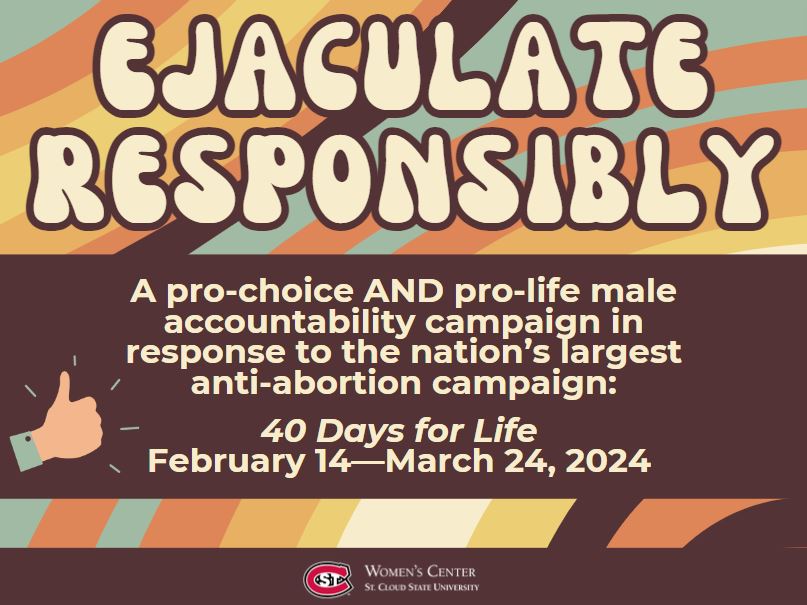














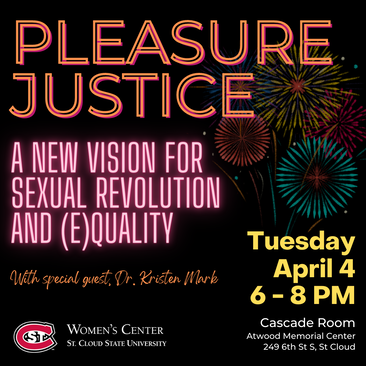
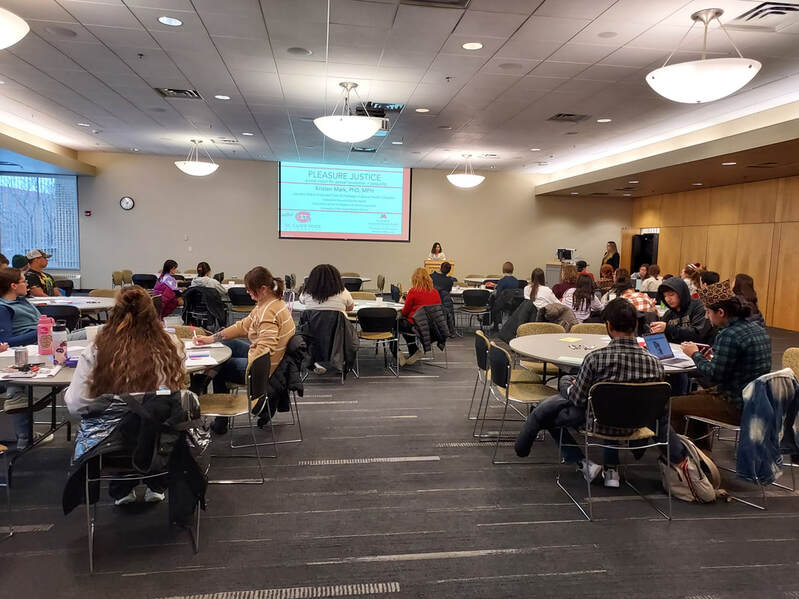
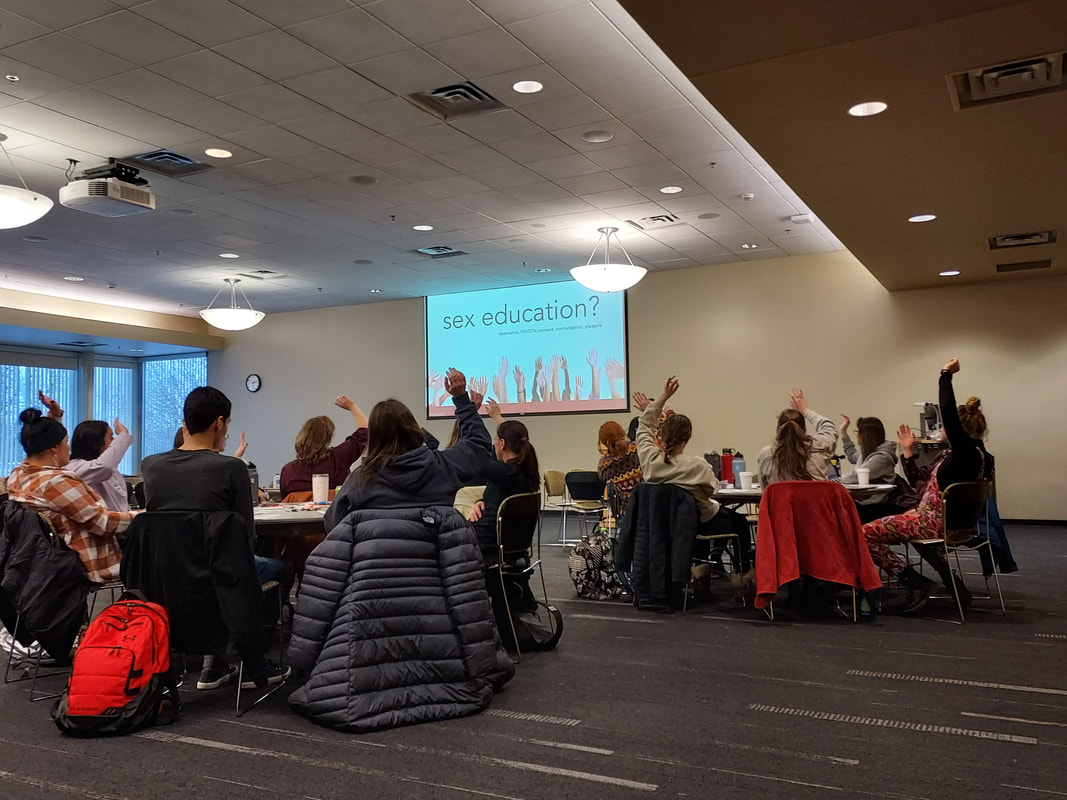
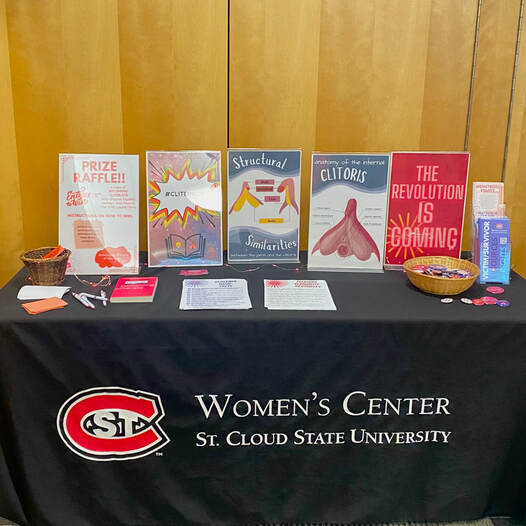
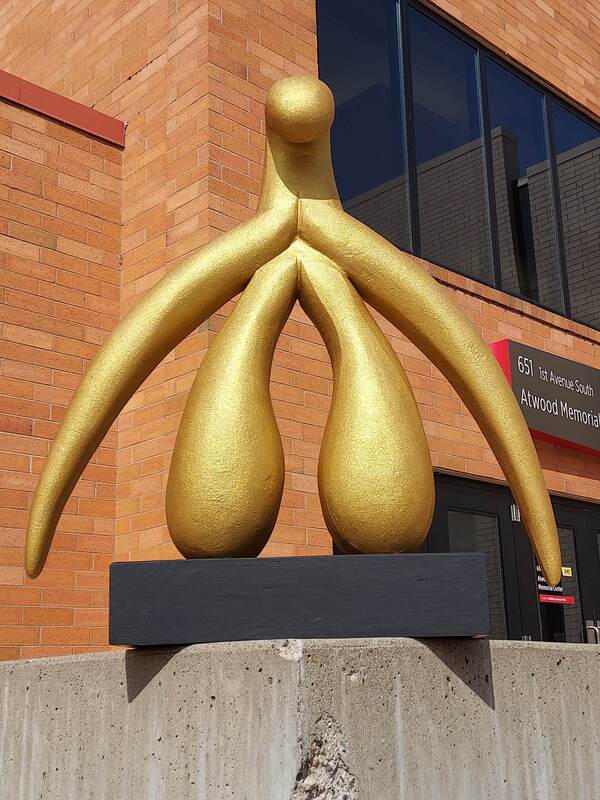
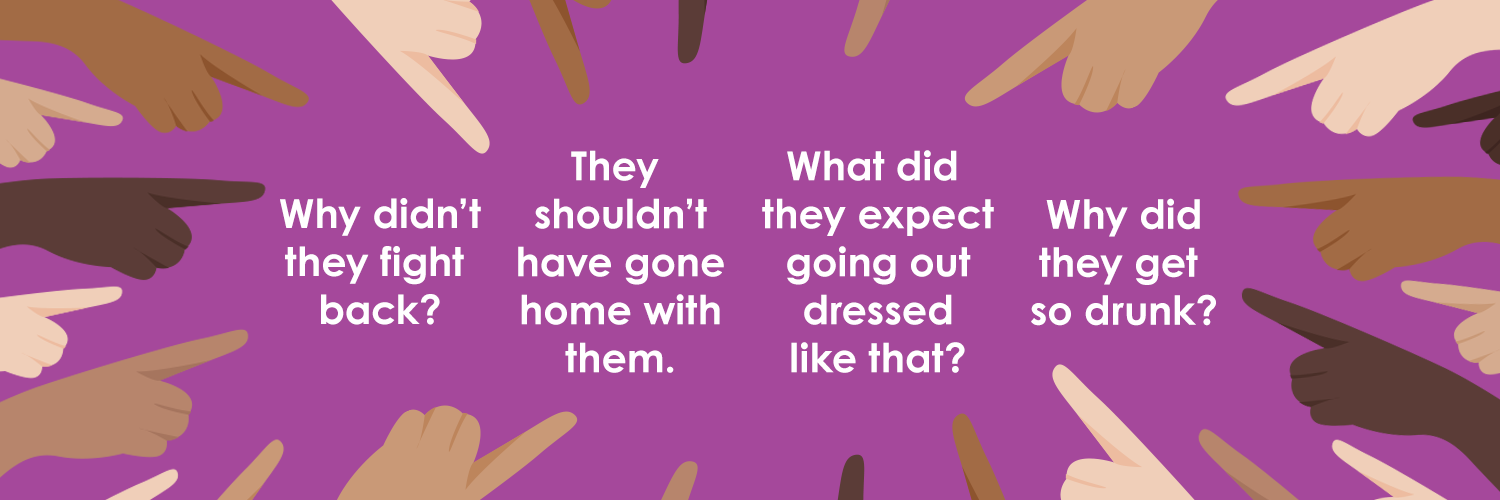
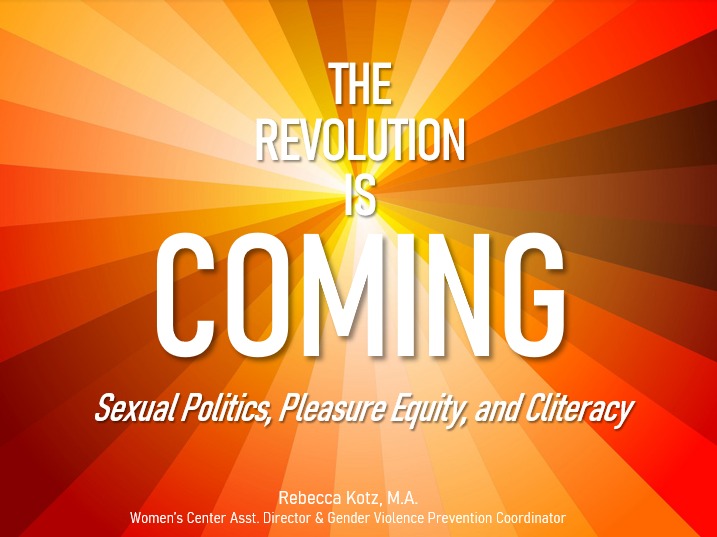
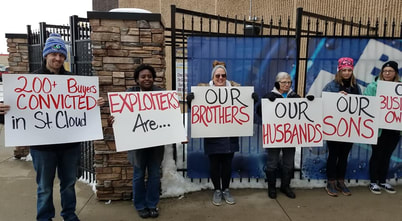
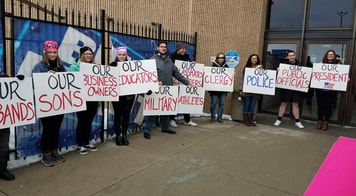
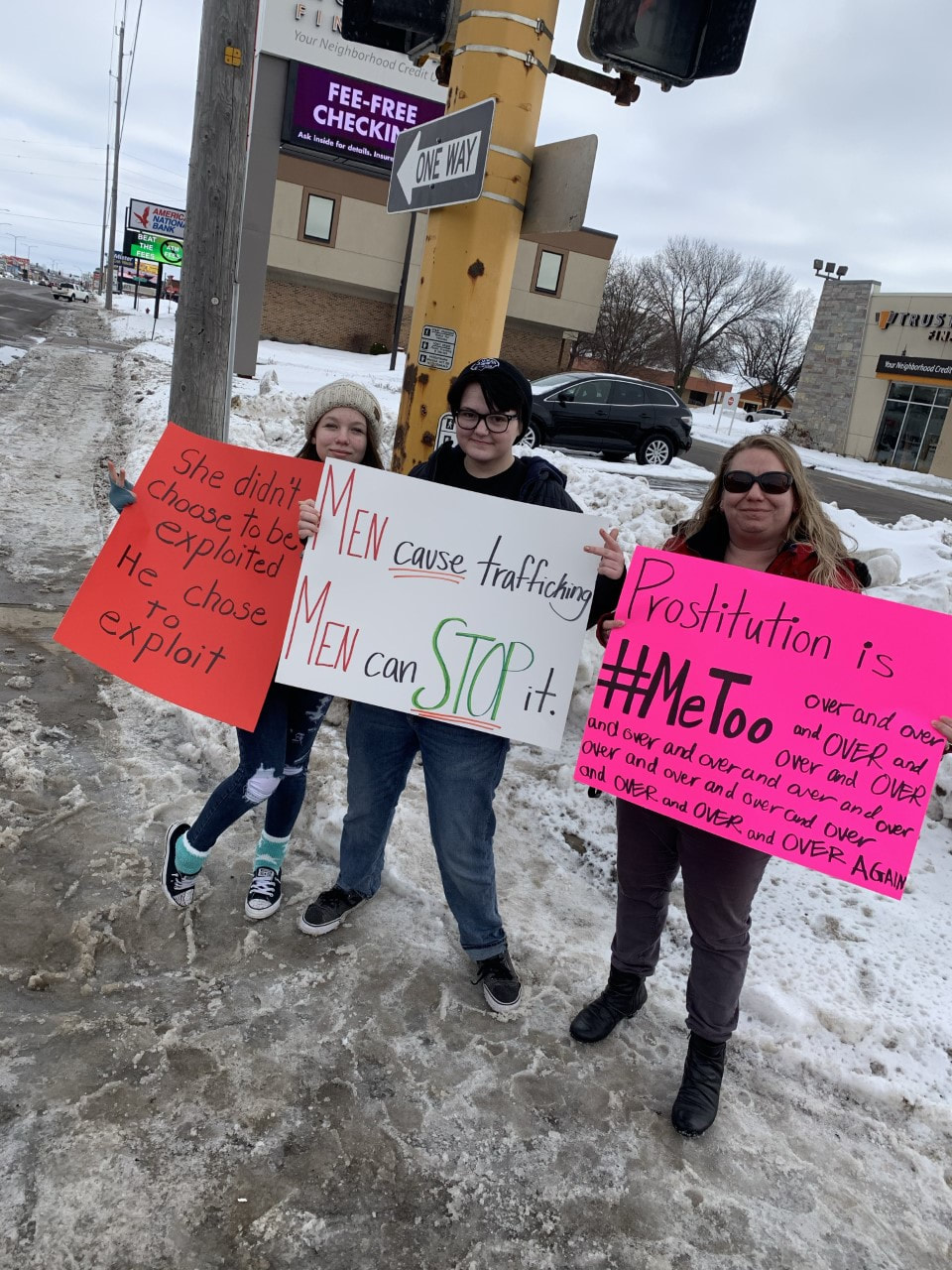
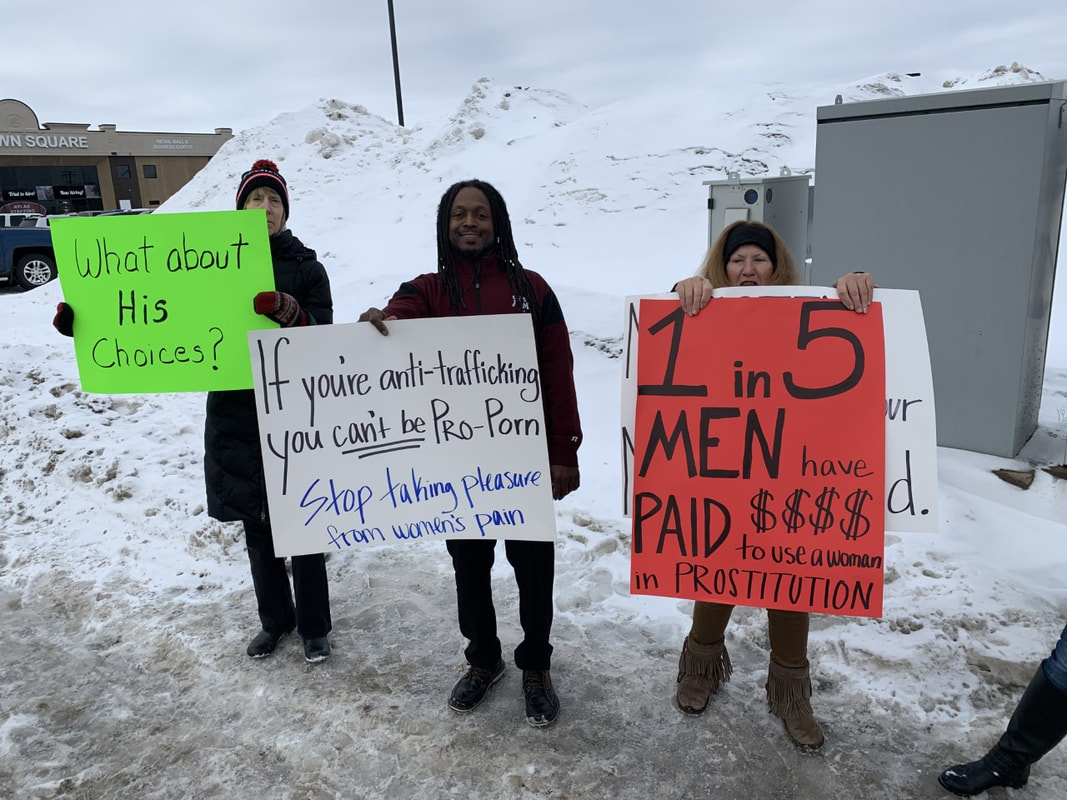
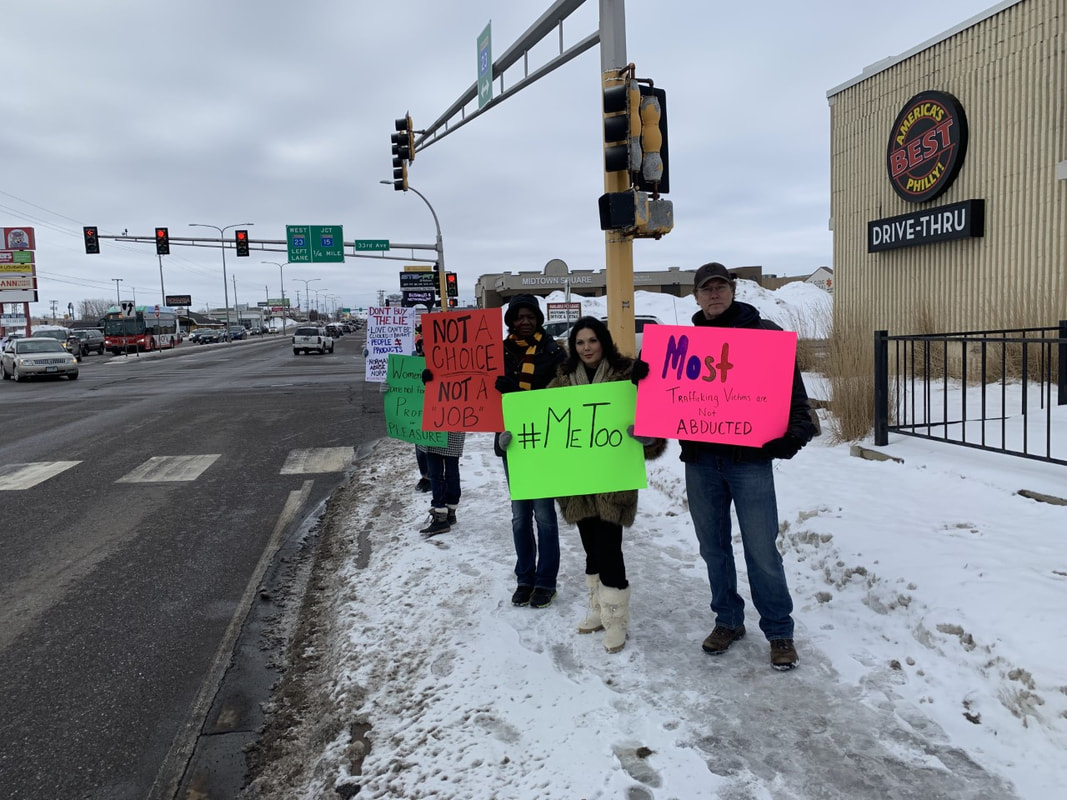
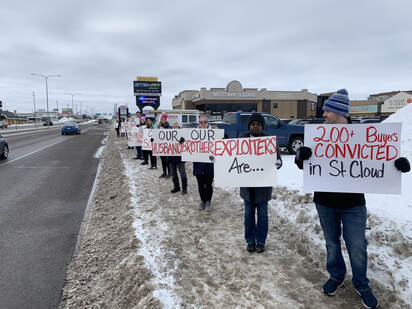
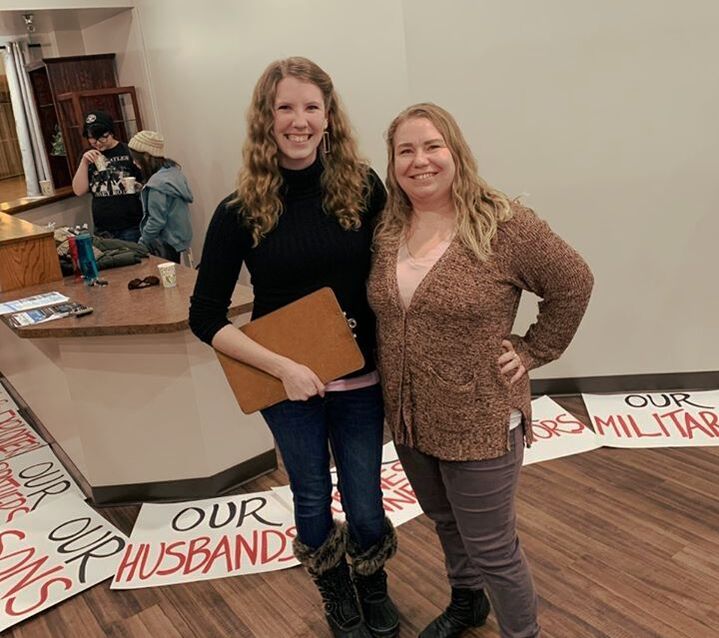
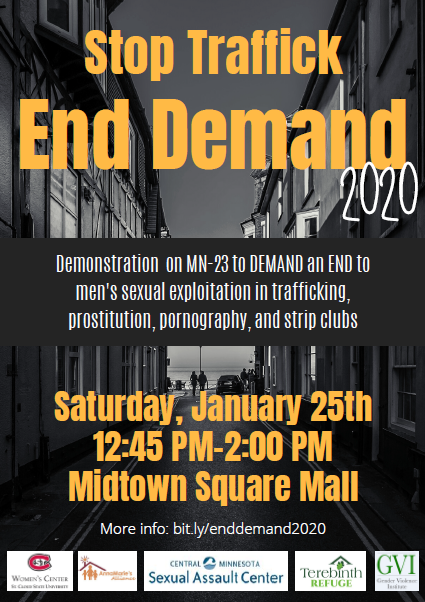
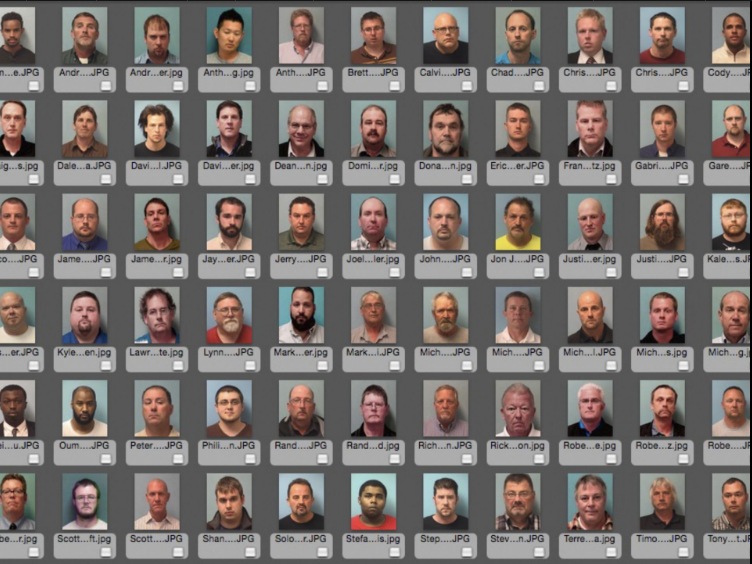
 RSS Feed
RSS Feed